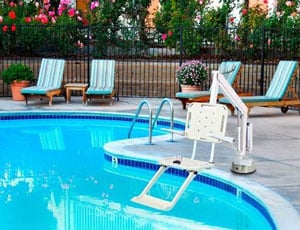
L.A. hotels are home to some of the most beautiful – and swinging – pools in the nation.
Marilyn Monroe posed for her first magazine photo shoot at the Hollywood Roosevelt Hotel’s, and every year celebrities gather around the infinity pool at the Mondrian after the Academy Awards, just to name two.
Now, hotel owners and managers are being forced to welcome a newcomer to the scene, and they aren’t happy about it –mechanical lifts to lower the disabled into the water.
At issue is a recent demand by the U.S. Department of Justice for hotels to install permanent lifts to meet updated regulations under the Americans With Disabilities Act of 1990.
The hotels had believed that buying portable lifts that could be wheeled away would have met requirements, but a late January clarification by the Justice Department disagreed with that interpretation.
Many owners and managers privately acknowledge that they think the permanent devices won’t fit in at fancier pools, but say their primary complaint is that the devices are too costly.
Ray Serafin, manager of the Sheraton Pasadena, said that the hotel bought a portable chairlift for its small outdoor pool six months ago.
“We were trying to be proactive. I think that’s the unfairness of it all,” Serafin said. “That’s what has a lot of owners in an uproar. If you’ve already spent money, now you’ll have to respend.”
Pool lifts don’t come cheap, costing between $3,000 and $9,000 depending on style, with installation running as high as $10,000 – a hefty cost, especially for smaller lodgings. Portable lifts cost about the same but do not require installation.
Under the act, hotel swimming pools and spas have been required for 20 years to be accessible to disabled guests. That has meant installing elevators, ramps and railings on the way to the pool.
Then, in September 2010, the Justice Department published regulations requiring places of public accommodation – including hotels, resorts and swim clubs – to remove barriers of entry to swimming pools and spas as far as it is “readily achievable to do so.” That prompted many L.A. hotels to buy pool lifts that can be moved to access multiple pools and be stored away from the water when not in use.
Jim Butler is a lawyer at Jeffer Mangels Butler & Mitchell LLP in Century City who represents hotel owners. He said that his clients have a legitimate gripe that the government waited too long to issue its interpretation of the new regulations.
Still, Butler said, they have few options, given how advocates for the disabled are aggressive litigants.
“The only safe thing to do right now is to comply with the rules as the department has interpreted them,” he said. “These pool lifts may be expensive, but it’s going to be expensive to get sued, too. Take your pick: You can pay me now or you can pay me later.”
The late change in interpretation had hotels and pool lift manufacturers scrambling to meet what had been a March 15 deadline to install the permanent lifts.
But industry officials complained there was no way that all 300,000 public and commercial pools in the United States could have installed permanent lifts by last week. So the White House issued a 60-day extension on March 15 that will push the compliance date to May 15.
Rob Nelson, logistics manager for Spectrum Aquatics in Missoula, Mont., one of only a few large pool lift manufacturers in the nation, said its orders are backlogged.
“As of now we have thousands and thousands of lifts on order, and our lead time is three or four weeks out. It just seems to be growing every day,” said Nelson, who expects that wait to reach eight to 10 weeks before long. In the past, the company was able to fill orders in two or three days.
With such a backlog, the American Hotel & Lodging Association said it is pushing the Justice Department to agree to a longer six-month extension to allow hotels more time to understand and fully comply with the law. And those deadlines are meaningful.
More than 13,000 lawsuits have been filed against businesses accused of not meeting ADA regulations since 2000, with 41 percent of them in California alone. Some have been filed by the government and others by private citizens and advocacy groups, which often take a hard line on violations.
For example, prior to the White House extension last week, the American Association of People With Disabilities issued a statement that hotels have had plenty of time to develop a compliance plan and get lifts installed by March 15.